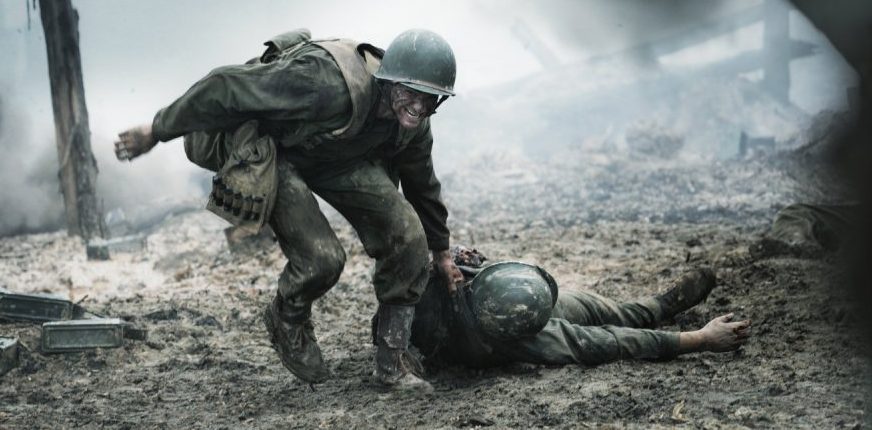| Worth seeing: | to see Mel Gibson come in from the cold, with a well told story of unexpected wartime heroism |

| Director: | Mel Gibson |
| Featuring: | Andrew Garfield, Hugo Weaving, Rachel Griffiths, Sam Worthington, Teresa Palmer, Vince Vaughn, Ben Mingay, Charles Jacobs, Damien Thomlinson, Dennis Kreusler, Firass Dirani, Goran D Kleut, Harry Greenwood, Luke Bracey, Luke Pegler, Michael Sheasby, Robert Morgan, Ryan Corr |
| Length: | 139 minutes |
| Certificate: | 15 |
| Country: | Australia, US |
| Released: | 27th January 2017 |
WHAT’S IT ABOUT?
When the US entered the Second World War, the younger generation was bursting with patriotism, lining up to sign up to serve their country overseas.
A series of traumatic experiences during his childhood and his strict Seventh-Day Adventist upbringing have left Desmond Doss (Andrew Garfield) a pacifist – he won’t even touch a firearm, let alone use it – and he certainly won’t work on the Sabbath, but his drive to serve his country remains undiminished – not as a soldier, but as a medic.
The unit he joins doesn’t quite know what to make of him. To his comrades, the idea of being a conscientious objector is tantamount to being a chicken – he clearly can’t be relied on to protect anyone on the battlefield, can he? Soldiers need their comrades to have their backs.
His drill sergeant (Vince Vaughn) and captain (Sam Worthington) conspire to make life difficult enough that he’ll want to quit, but Private Doss is not a quitter and refuses to budge.
When he finally makes it to the theatre of war, the bravery of this “coward” far outweighs the valour of his rifle-carrying alpha-male comrades, and asking God to help him save “just one more” again and again, Private Doss became the first man to win America’s highest military honour, the Medal of Honor, without firing a single bullet.
WHAT’S IT LIKE?
After years in the wilderness – whether through alcohol-related controversies in the news or the alcohol-related mess of his most recent directorial outing, Blood Father – Mel Gibson has returned to form and the establishment has welcomed him back with his first directing Oscar nomination since he won for Braveheart, 21 years ago.
This surprising, multi-faceted and exciting wartime drama is a comeback and a half for the actor-turned-director, with its young British star Andrew Garfield picking up another of the film’s six Oscar nods.
The casting is interesting, for a film about the bravery of an American soldier – apart from a British lead, the Australian actor has filled the supporting cast with some of his finest fellow countrymen-and-women, with Hugo Weaving and Rachel Griffiths, as Private Doss’s parents, joining Sam Worthington in key roles. Gibson himself is one of the few Australian figures not to grace the screen and the only American to receive much attention in this most American of stories is the comic giant Vince Vaughn delivering a rare, surprisingly effective dramatic turn.
Telling the real-life story of a war hero can go either way – it can be mawkish or thrilling and Gibson’s well-structured window into the young Private Doss is far closer to the latter. As it unfolds, flashbacks explain where his pacifism comes from, this trait adds a new twist to the military training we see in so many war films and we’re even treated to a romance and a little courtroom drama before we’re thrown into one of the most visceral battle scenes seen on screen for years. It’s an episodic compendium of different films that build towards its undoubted crescendo.
But in keeping with the philosophy of its protagonist, this isn’t a scene about killing, but survival. As the Japanese defenders of Hacksaw Ridge shoot down Americans like wooden figures at a funfair gun-range, with one ambush after another, we follow Private Doss as he refuses to leave his stricken comrades for dead and drags barely-breathing bodies through hails of bullets and explosions and lowers them to safety against all the odds, long after everyone else has given up on them.
While the film is undoubtedly dramatic, the story is unconventional in that the protagonist doesn’t have what scriptwriters would refer to as a character arc – from the time we first meet him as an adult until the time Gibson’s work is done little changes about his outlook – this is specifically a film about a character who doesn’t change – in fact, this is a film where only the supporting characters around him change, in their perceptions of him. And many of the smaller roles are rather thinly drawn to oil the mechanics of this sometimes sentimental, sometimes familiar, sometimes necessarily gory narrative machine.
At approaching two and a half hours, the film’s a little on the long side, but its episodic structure ensures that it never drags, although some viewers might be frustrated by the time it takes us to get to the eponymous battle. Gibson uses a handful of directorial cliches to squeeze as much as he does into a comfortable running time – down to the use, over the closing credits, of library clips from interviews with some of the real-life characters, including Doss himself, which give all the more credibility to this incredible story.
